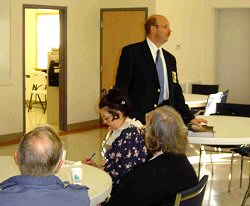 “It is growing in our county at a 20 percent rate”, Captain Huey Hoss Mack, Jr., reported factually. If the “it” was a stock, it would double its value in three and a half years, but the it is “identity theft”, ID for short. Baldwin is a prosperous county. Prosperity attracts wealth. Wealth attracts criminals. Thus began Mack’s presentation to Zion’s “710 Second Tuesdays” for March. Working with the Criminal Investigation Division of the Baldwin County Sheriff’s Office since 1989, Mack has been focusing on this growing identity theft problem with his background in forensic investigation (Chief Forensic Investigator with the Alabama Department of Forensic Sciences from 1985 to 1989) and business (MS in Management from Troy State University along with a BS in Criminal Justice). “There were 86,000 victims in 2001. By the end of 2005 there will be nearly 180,000 victims. There are between 4000 and 4500 cases of identification theft in Alabama right now. Recognize that 70 percent of these thefts are never reported for one reason or another.” It turns out that Alabama is ranked 18th for ID theft in the country.
“It is growing in our county at a 20 percent rate”, Captain Huey Hoss Mack, Jr., reported factually. If the “it” was a stock, it would double its value in three and a half years, but the it is “identity theft”, ID for short. Baldwin is a prosperous county. Prosperity attracts wealth. Wealth attracts criminals. Thus began Mack’s presentation to Zion’s “710 Second Tuesdays” for March. Working with the Criminal Investigation Division of the Baldwin County Sheriff’s Office since 1989, Mack has been focusing on this growing identity theft problem with his background in forensic investigation (Chief Forensic Investigator with the Alabama Department of Forensic Sciences from 1985 to 1989) and business (MS in Management from Troy State University along with a BS in Criminal Justice). “There were 86,000 victims in 2001. By the end of 2005 there will be nearly 180,000 victims. There are between 4000 and 4500 cases of identification theft in Alabama right now. Recognize that 70 percent of these thefts are never reported for one reason or another.” It turns out that Alabama is ranked 18th for ID theft in the country.
Identity theft results when personal information is used by another for his own personal gain. Obtaining a Social Security number opens the door for a thief to access all kinds of things that can be turned into goods or cash. But names, addresses, telephone numbers, computer e-mail addresses, and a host of other information connected with each of us, potentially can provide the access point for that thief.
ID thievery appears centered in Florida, Texas, California, and, of course, on the World Wide Web. Thieves use loan applications, credit card applications, statements of one kind or anther, telemarketing, and just plain trash, to obtain those magic numbers that unlock access to our resources. Once that personal information has been obtained, thieves typically “hit” the consumer’s resources within a month about half of the time.
Protection begins with controlling numbers in our lives. Use of the Social Security number should be limited. If it is on our checks or on our bills or on our drivers’ licenses, we need to remove them. When we get things like credit card or insurance applications, particularly with pre-printed names and addresses, we should be careful to destroy them. If they go in the trash, it is not enough just to put them in the garbage since garbage has been scavenged to obtain such information. Investing in a document shredder to make such information unsalvageable is desirable. But mail with clearly printed addresses and the like would best be shredded as well. Old bills, old statements (think especially of utility bills), and old registrations with personal identification information should get the shredder treatment before finding the garbage can.
Captain Mack lamented, “This is a problem that is hard to solve.” He noted that banks are helpful in trying to reduce the problem. Consumers are advised to get a copy of their credit reports on a regular basis; every five years if there have been no identification issues for a person. “Never give out personal data unless you initiate an application.” There are very few freebies in life, and the consumer should not forfeit personal information for anything or anyone who promises what is improbable. “For telephone marketers, the best strategy may be to ‘just hang up.’” If people find financial activity that does not reflect their usage, they need to act immediately. The Federal Trade Commission operates the “FTC Identity Theft Hotline” toll-free at 1-877-IDTHEFT (1-877-438-4338). Captain Mack is a potential resource close at hand in the Robertsdale office of the Baldwin County Sheriff.
There are simple steps that one can incorporate into daily activity. For example, read the documents you get and don’t throw away personal information. Don’t carry that Social Security card in your wallet. Use your ISP’s spam protection programming and only visit reputable web sites when you use your internet browser. When Mack was asked, “What is ok to put on your checks?” The questioner received this answer: “Name, address, phone number--nothing else.” If some kind of further identification is needed, don’t give that Social Security number out if at all possible. Many times the check cashier will accept a driver’s license number as an alternative. “What about solicitations via internet?” Check out any business. Use a search engine like Google or Yahoo or go to the BBB.
Captain Mack shared ID Theft: When Bad Things Happen to Your Good Name, a publication of the Federal Trade Commission, which is available through Captain Mack’s office in the Baldwin County Sheriff’s Office or read it online by clicking on the above link. It is a resource that offers both general and specific advice concerning identification protection.